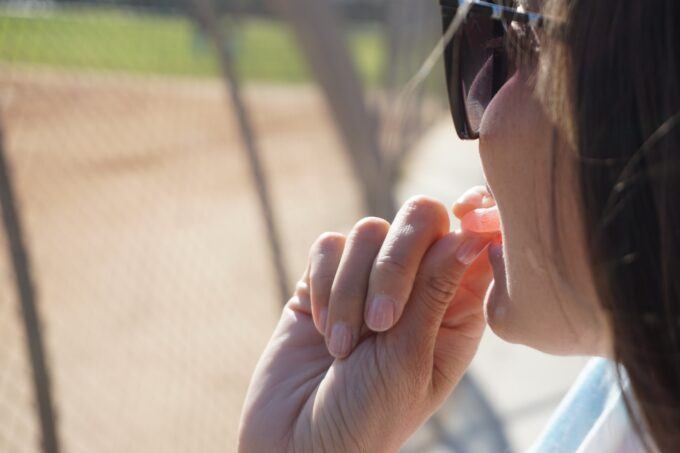
Photo by Elsa Olofsson
“It was a deplorable situation. They read us our rights and asked where the weed was.”
This was what small business owner Mike Kimzey said after the Bullitt County Sheriff’s Department in Kentucky walked into his smoke shop with a search warrant in October of last year.
“It felt like they were raiding a kingpin drug dealer,” said Kimzey, who was accused of selling cannabis — an illegal Schedule I substance — after the police department claimed they had “smelled” it. The search only yielded cigarettes, glass pipes, and THC gummies.
A similar scenario played out this January in Catoosa County, Georgia, where vapor shops began to receive warnings from the local sheriff’s department. The notice, supplied by the Sheriff, insisted that their shop’s operation violated state law. The issued notice indicated that the sheriff’s department had purchased and tested products sold at the store, finding that they “contained significant levels of delta-9 THC,” the psychoactive chemical found in cannabis.
“We have already had several incidents in our community where juveniles have had adverse reactions to vapes and other products containing THC … this is some of the very reason we do not want this in our community. Besides, it is a violation of Georgia law,” the notice from the sheriff’s department disclosed.
After receiving a warning that sales of the THC-based products would result in criminal charges, one Georgia shop owner, Joe King, had to remove over 380 products off his shelves, totaling over $11,000 in lost revenue.
The shop owners in these states had a right to be confused. After all — CBD and delta-8 are legal according to the federal government.
In 2018, federal legislation, referred to as the ‘Farm Bill,’ legalized “agricultural commodities” made of hemp, including CBD and some THC products such as delta-8. Yet, the bill didn’t explicitly include the name of cannabis-based products — such as delta-8 or 9 — in the legislation. Without explicit federal lawmaking or guidance, law enforcement officials in states like Kentucky and Georgia have begun to punish small businesses.
Legislative nuances and inconsistent state legislations that cannot decide whether to explicitly allow the sale and use of delta-8 and 9 — federally deemed an agricultural commodity — are threatening the livelihoods of emerging entrepreneurs in nearly 20 states across the nation.
But the vagueness of the bill doesn’t just hurt business owners. This legislation leaves many consumers without a product to help with ongoing mental health concerns. From 2019 to 2020, usage rose by 257% and 705% from 2020 to 2021. Half of these consumers use the products for an array of mental health disorders such as bipolar disorder. Thus, action to clamp down on unclear regulations hurts businesses and exacerbates the ongoing mental health crisis in America.
According to Rolling Stone, “the U.S. CBD market sales are projected to land at around $16 billion by 2026” — almost as much as the e-cigarette industry. For example, in North Carolina, a small business owner saw the store welcome its largest revenues for the year from the sale of delta-8 products.
In May, the Ninth Circuit handed down an opinion that delta-8 products are legal. Specifically, “hemp-derived delta-8 THC falls within the definition of ‘hemp’ under the 2018 Farm Bill.” However, the Ninth Circuit made no decision on whether or not delta-8 products sold for consumption in interstate commerce would be legal — an important, and necessary, distinction to determine whether or not a product can be sold for recreational use. Thus, yet again, business owners and mental health advocates are left in the dark.
While most individuals seek to receive treatment for mental health disorders through conventional means, a growing number of individuals are seeking more holistic options. According to psychreg.org, “Delta 8 THC is one of the best all-natural solutions for depression.”
Harm reduction, a key component of public health improvement, must begin with the premise that it is impossible to have a drug-free society. As such, harm reduction seeks to avoid regulations that would perpetuate existing harms. State legal environments have become more restrictive for delta-8 and 9 despite the clear consensus that access helps those with mental health needs the most.
A 2021 research study found that 51% of participants said they used the delta-8 THC compound to treat mental health and medical conditions, including anxiety, depression, or bipolar disorder. More specifically, of the 51%, 69% used it for panic attacks, 52% for stress, 46% for depression or bipolar disorder, and 41% for chronic pain. The study also stated, “Although the legal environment is becoming more restrictive for delta-8-THC in comparison to delta-9-THC, results suggest that delta-8-THC may be equally effective for desired purposes of cannabis use…”
With a growing mental health crisis in America, access to non-harmful, non-addictive treatments is needed now more than ever. Vague and poorly written legislation cannot satisfy such a crisis.
Actions taken by state police agencies make it very clear — ambiguous laws leave both business owners and dependent consumers at risk of government overreach. State legislatures must clarify their language to limit police abuse and to preserve consumer liberties.